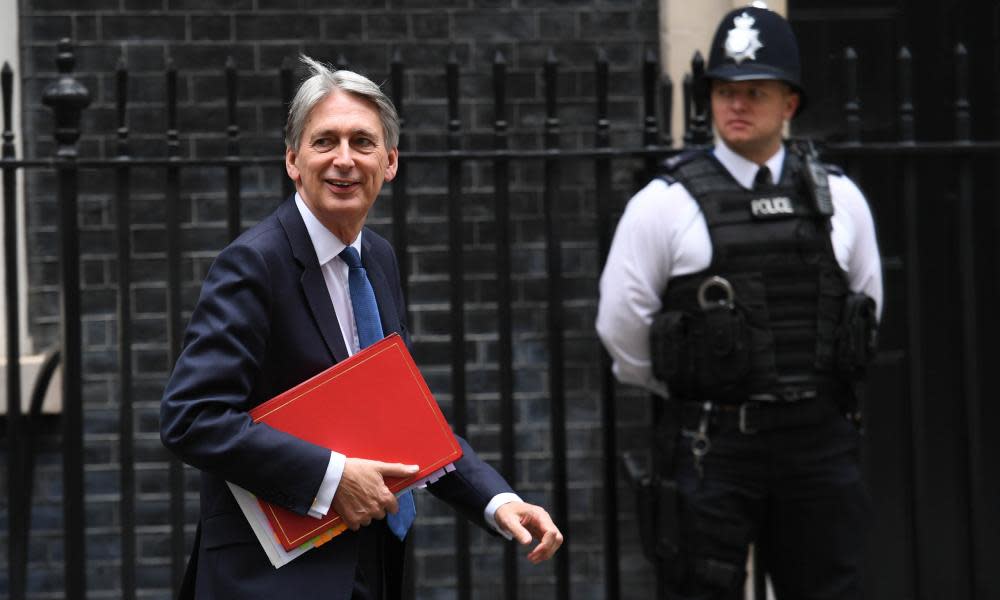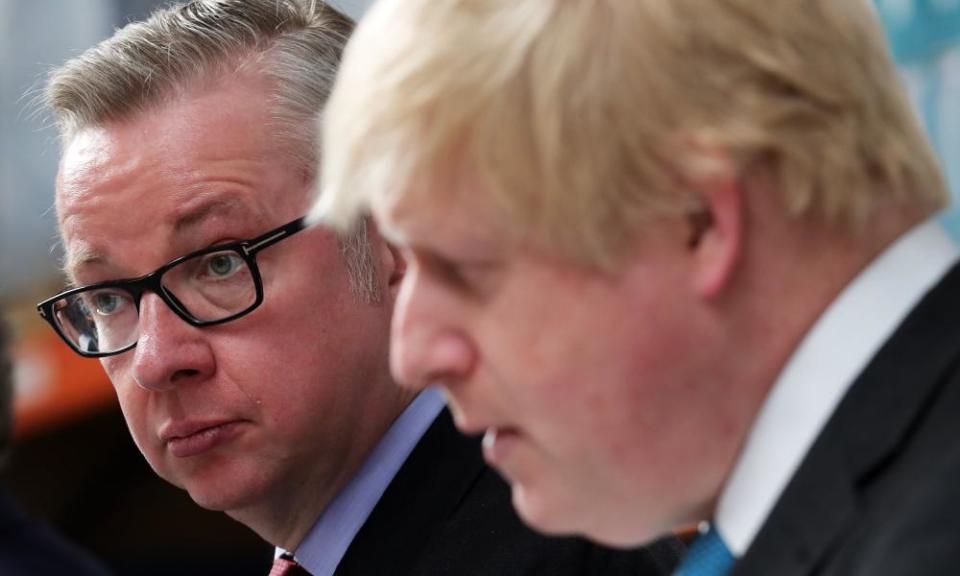The state of the Tory party is the only grand reveal of this budget | Andrew Rawnsley

Budget day used to mean something. It was one of the big ceremonial occasions of British politics, second only to the Queen’s Speech as parliamentary theatre and very often much more significant in the hierarchy of importance. The event was vested with unique rituals and the contents of the chancellor’s briefcase were reverenced with elaborate secrecy until the grand reveal to expectant MPs.
Philip Hammond will go through the motions this Wednesday. His gaunt and gangling figure will brandish the red box from the steps of Number 11 before he heads down the road. The traditions will be honoured, but they will be performed by an encircled chancellor in straitened circumstances who knows that much of his own party are out to get him. A man who has spent the weeks running up to the event telling Tory MPs that there are no “magic bullets” in his armoury would probably prefer not to be delivering a budget at all right now.
Some of the shrinkage in the status of the occasion can be put down to its erosion by long-term forces. Globalisation deprived governments of the ability to pretend that they were supreme masters of their own economic universe. The shrivelling of public reverence for its rulers has also had its effect. Gordon Brown handed operational control of interest rates to the Bank of England because chancellors were no longer trusted not to seek partisan advantage by fiddling with the cost of borrowing. George Osborne set up the Office for Budget Responsibility to mark the Treasury’s homework because chancellors were no longer trusted not to duke the figures. All the same, mention of those two past holders of the office is a reminder that even in recent and challenging times budgets could pack a punch. A powerful chancellor such as a Brown or an Osborne would exploit the occasion to play a decisive role in setting the direction of government and nation by launching substantial and enduring reforms.
Many are the Tories whose unsolicited, pre-budget advice to Mr Hammond is to be “big and bold”. They urge him to seize the moment as a chance to vest this flailing government with a coherent and convincing purpose. They make that demand in the expectation not that their hopes will be fulfilled, but that they will be disappointed by the man and the measures. This chancellor was not supposed to be flattered when his officials gave him the nickname of “Box Office”. The friendliest things said by colleagues is that he is a technocrat who can add up and that he approaches the hazards to the economy posed by Brexit with a more grown-up attitude than some of his quarrelling companions in the cabinet. Flair and ingenuity are not words that come attached to this chancellor. Nor is he associated with a fingertip feel for the public mood or the sensitivities of his colleagues. His horizon is too narrow, his position is too precarious and the future is too clouded to meet the demand for him to be the agent of a rejuvenation of this government. He didn’t acquire his other nickname, “Spreadsheet Phil”, for nothing.
This makes it convenient for colleagues to blame their party’s problems on deficiencies in the chancellor’s political personality, but that is mainly displacement activity. Even were the Treasury occupied by a more visionary and inspirational figure, this budget would be constipated by the context in which it is delivered. The event is a meagre affair compared with Brexit, the eclipsing enterprise that looks more difficult than ever. The outcome of that perilous experiment will be many multiples more important for the future of the British economy than anything the chancellor does or does not do on Wednesday. He will say things about growth in the knowledge that the forecasts will be more than usually dodgy because of the swirl of Brexit-induced uncertainties. For any company pondering whether or not to pull investment and jobs from these shores, whatever the chancellor has to say about productivity will matter far less than where businesses will be left once Britain has departed the EU. And that he won’t be able to tell them.
The run-up to the budget has served one useful purpose. It has illustrated how collective sense and discipline have fragmented within the governing party. From different quarters, Conservative MPs clamour for more spending on this politically sensitive area and more cash for that personal enthusiasm. From other parts of Toryland, there is the demand to use any surplus funds for tax reductions. Tory MPs can glibly chorus that the chancellor should be “big and bold”. Saying that is a lot easier than managing to agree among themselves about what radicalism should amount to. The chancellor cannot possibly meet the combined weight of their competing expectations. Even if he were a political conjuror of the highest class, Mr Hammond could not magic up a budget that would satisfy so many contradictory demands. Bold usually means controversial and anything tricky will be a nightmare to negotiate through a parliament where the government lacks a reliable majority.

The prelude to this budget has also been accompanied by a further disintegration of cabinet cohesion. The prime minister was sent a “secret letter” by Boris Johnson and Michael Gove – a missive so “for your eyes only” that it swiftly found its way on to the front page of a newspaper with its barely disguised call for the prime minister to sack the chancellor for lacking their Brexit zealotry.
Before any budget, spending ministers have always made “submissions” to the Treasury. Bolder characters would occasionally make coded bids for extra funding for their areas of responsibility. What I don’t recall is ministers being so brazenly open about it. The old rules of “budget purdah”, which dictated that not a word about it was said in public before the event, have given way to a new anarchy of “budget souk”, in which its contents are publicly haggled over in advance.
Sajid Javid has made a weekly event of tabling his demands for more spending on housing. Jeremy Hunt has led a cabinet rebellion against the public sector pay cap and bid up anticipation of what he will secure for the NHS. I expect there will be more attention to housing in the budget, but the measures will not be radical enough to address a crisis that Mr Javid calls “unprecedented”. I am told there will be more for health, but it won’t be sufficiently generous to appease the government’s critics. The overall effect of all the Tory clamour around the budget has been to raise expectations that cannot be fulfilled, pre-ordaining that it will be regarded as a let-down by campaign groups and present an easier target for the opposition. This breakdown in the traditional budget disciplines has been encouraged by the weakness at the top of government. The prime minister does not have much strength in reserve to buttress her chancellor even if she wanted to. And she does not want to deploy whatever residual authority she might possess in support of a chancellor she does not believe in. Her former chief of staff and continuing confidant, Nick Timothy, pulled aside the curtain on the state of their relationship when he recently wrote: “Instead of being bold in seeking solutions, Philip Hammond’s instinct will always be to maintain existing policy, regardless of its quality. He lacks a burning desire to change people’s lives for the better, and imagination to see possibilities beyond how the world works today.”
The old rules of budget purdah, dictating that nothing be said in public, have given way to the anarchy of budget souk
The temperature gauge of the relationship between the neighbours in Downing Street fell to zero during the election when the prime minister locked her chancellor in a cupboard for the duration of the campaign. She did so because she planned to sack him afterwards He knows she wanted to sack him and would have done so had the voters not saved his bacon by depriving the prime minister of a parliamentary majority.
They wouldn’t, of course, be the first prime minister and chancellor to have a sour relationship. Tony Blair and Gordon Brown had many titanic confrontations, but they were generally careful not to have too many of the rows in front of the children. The bad blood between the current unhappy partnership on Downing Street is an open secret in Whitehall and is reliably reported to have been made worse by endless wrangling about the contents of this budget.
When he gets to his feet on Wednesday, Philip Hammond will do so conscious that his most dangerous enemies will be sitting alongside and behind him. The hardline Tory Brexiters, they who disparage him as “Eeyore”, have been after him for months because he is the most influential advocate within the cabinet for a softer form of departure. They are deliberately setting high expectations of the budget that they know he cannot meet, the better to position themselves to demand his head when he does not deliver. A substantial number of Tory MPs, among them prominent members of the cabinet, are willing him to flop. They want the budget to be a disaster to give them an excuse to move against the chancellor. That tells you what you need to know about how bizarre the internal pathologies of the Conservative party have become. That is the big reveal of this budget.

 Yahoo News
Yahoo News 
